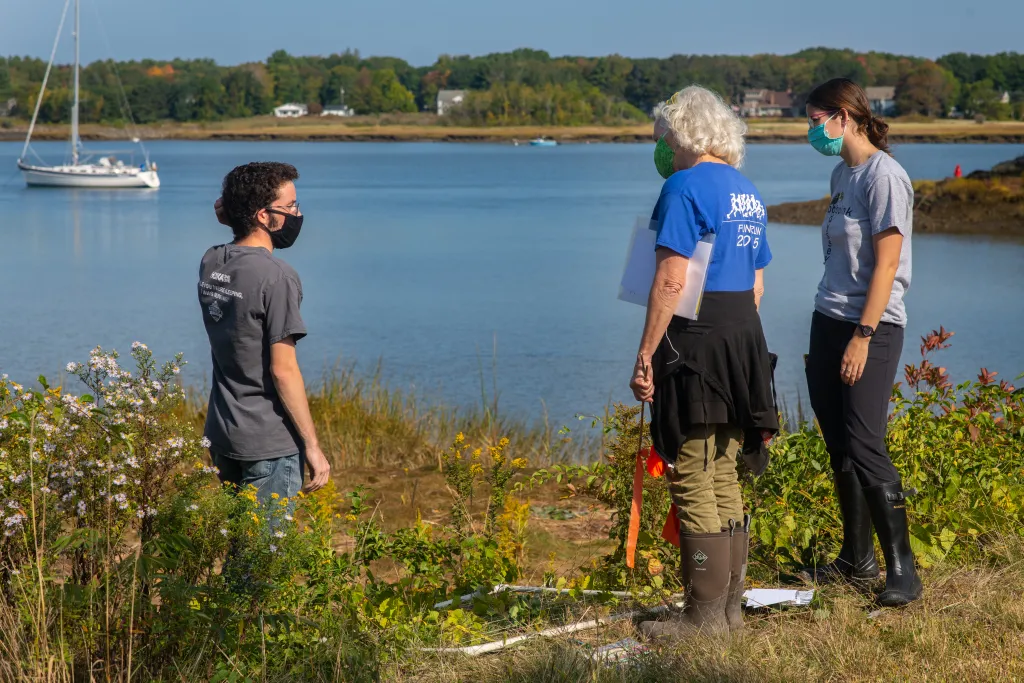Be Part of the Solution
Do you want to be part of the solution to one of the defining environmental and social problems of our lifetime? UNE’s Climate Change Studies minor is an interdisciplinary course of study, drawing on expert knowledge of faculty throughout the College of Arts and Sciences to explore climate change from a diversity of perspectives impossible to find within most single programs. By examining the scientific, social, political, psychological, and ethical dimensions of the issue, you will acquire a marketable understanding of how climate change relates to business models, public policy, economies, livelihoods, conservation, and human health and happiness that will serve you well in a vast number of careers.
Meet Kiara, Marine Affairs ’22
A Marine Affairs major who interned in the Maine Governor's Office of Policy Innovation and the Future, Kiara analyzed climate change data, helping her colleagues meet the state’s most urgent challenges.
Why UNE for you Minor in Climate Change Studies
One of only two formal climate change minors in the Northeast, this minor is truly unique, serving as the perfect complement to virtually any major and enhancing career prospects in a wide variety of fields.
- Interdisciplinary, drawing from eight different areas of study
- Flexible, with only three foundational courses
- Focused on hands-on learning, including opportunities to participate in political action, educational efforts, etc.
- Composed of a cohesive community of students and faculty bound by a shared interest
- Provides eligibility to apply for the Kinsman Trust Scholarship for Climate Change Studies (1-3 UNE Climate Change Studies minors receive $1,000 to $5,000 annually)
UNE’s climate change minor has helped me understand what needs to be done on local and international levels to mitigate the effects of our climate crisis. Experience from my climate classes has helped me gain an internship working under Governor Janet Mills as her climate and energy intern.”
— Kiara Frischkorn ’22, Marine Affairs major/Climate Change Studies minor
What Will You Study? Climate Change Studies Minor Curriculum Overview
Experiential Learning
Solving an issue like climate change requires real-life, hands-on work, and we strive to prepare you for that — from classroom activities and research projects to internships and special out-of-class activities.
Classroom Activities
- Developing a vulnerability analysis for the UNE campus
- Designing an all-electric fleet of UNE vehicles
- Field trips
Research
- Invasive species in a warming ocean
- Implications of sea level rise for New England salt marshes
- Climate-induced changes in grassland bird migration
Internships
- Maine Governor’s Office of Policy Innovation and the Future
- City of Biddeford Climate Task Force
- Maine Conservation Voters
- Washington Internship Institute (D.C)
Co-curricular Activities
- Participation in conferences
- Creation of University-wide climate-themed events
- Participation in climate demonstrations
- Meetings with governor’s staff for budget advocacy

Examples of Available Courses
In addition to three foundational courses, you will select three elective courses. Below are just some of the classes from which you may choose:
- Climate Change, Oceans, and Law
- Climate Change Adaptation: Planning and Policy
- Environmental Economics
- Gulf of Maine Field Studies
- Climate Change and Conservation
- Global Change Biology
Curriculum
A student may minor in Climate Change Studies with the approval of the minor program contact. To complete this minor, students are expected to successfully complete the following course of study:
| Program Required Courses | Credits |
|---|---|
| ENV 208 – Climate Change: Causes, Consequences, and Solutions | 3 |
| PHY 218 – Energy and Climate Change or MAR 460 – Physical Basis of Climate Change | 3–4 |
| SOC 227 – Climate Change and Society | 3 |
| Total Credits | 9–10 |
| Select One (1) Policy Elective* | Credits |
|---|---|
| ENV 250 – Environmental Policy in Comparative Perspective | 3 |
| ENV 365 – Climate Change Adaptation | 3 |
| MAF 200 – Introduction to Marine Pollution | 3 |
| MAF 300 – Climate Change, Oceans, and Law | 3 |
| MAR 316 – Science and Society | 3 |
| PSC 201 – Introduction to International Relations | 3 |
| PSC 205 – Introduction to Politics and Environment | 3 |
| PSC 306 – Environmental Politics | 3 |
| Total Credits | 3 |
| Select One (1) Natural Sciences Elective* | Credits |
|---|---|
| BIO 235/235L – Winter Natural History w/Lab | 4 |
| BIO 413 – Global Change Ecology | 3 |
| BIO 422/422L – Coral Reefs w/Lab | 4 |
| ENV 318/318L – Advanced Field Methods in Avian Ecology and Conservation w/Lab | 4 |
| ENV 328 – Environmental Pollution: Ecosystems, Wildlife, and Human Health | 3 |
| MAR 270/270L – Oceanography w/Lab | 4 |
| MAR 436/436L – Natural History of Iceland w/Lab | 4 |
| MAR 460 – The Scientific Basis for Global Climate Change | 3 |
| MAR 464 – Polar Biology | 3 |
| Total Credits | 3–4 |
| Select One (1) Social Sciences and Humanities Elective* | Credits |
|---|---|
| BUEC 390 – Environmental Economics | 3 |
| BUEC 395 – Ecological Economics | 3 |
| ENV 321 – Environmental Communication: Expert Practices for Environmental Management | 3 |
| ENV 328 – Environmental Pollution: Ecosystems, Wildlife, and Human Health | 3 |
| ENV 340 – Environmental Movements and Social Change | 3 |
| ENV 342 – Environmental Racism/Environmental Justice Movement | 3 |
| ENV 344 – Environmental Ethics | 3 |
| PHI 202 – Ethics of Science and Technology | 3 |
| PHI 330 – Environmental Philosophy | 3 |
| PSY 255 – Social Psychology | 3 |
| SOC 210 – Displaced Cultures and Society | 3 |
| SOC 226 – Environmental Sociology | 3 |
| SOC 265 – Social Issues/Problems Global World | 3 |
| SOC 320 – Community Organization | 3 |
| SOC 377 – International Development | 3 |
| Total Credits | 3 |
| Minimum Total Required Credits | 18 |
|---|
Please note: While some courses can fulfill both core and program requirements, the credits earned do not count twice towards the minimum total required credits for the degree.
*Internship Opportunities (Optional): Internships may substitute for one (1) of the above elective courses, subject to advisor and internship coordinator approval. The internship must deal explicitly with some aspect of climate change science, mitigation, or adaptation.
To learn more see the Academic Catalog.
UNE Online also offers a Master of Science in Climate Change Leadership.


Career Paths for your Minor in Climate Change Studies
Employers are increasingly interested in hiring those with an understanding of climate change for positions within fields ranging from business, economics, and health professions to marine science, environmental consulting, and political ecology. A Climate Change Studies minor complements many different majors at UNE and prepares you for a wider breadth of career possibilities than your major alone.
Having a background in climate change studies will benefit a multitude of careers, including:
- Policy Analyst
- Public Health Researcher
- Director of Sustainability (government, business)
- Renewable Energy Technician
- Wildlife Biologist
- Environmental Lawyer
- Public Health Administrator
- Urban or City Planner
- Landscape Architect
- Agricultural Extension Agent
- Secondary School Teacher
- Land Manager
- Financial Planner
- Business/Insurance Professional
| Pair a Climate Change Minor With a UNE Major in | For a Career in the Field of |
|---|---|
|
|
|
|
|
|
|
|
|
|
|
|
|
|
|
|
|
|
Climate Change Careers by the Numbers
new climate analyst jobs expected in the next 10 years
national median salary for environmental scientists and related specialists
Contact
Undergraduate Admissions
Contact Undergraduate Admissions at (800) 477-4863 or email admissions@une.edu. You can also stop by our office on the Biddeford Campus Monday–Friday from 8 a.m.–4:30 p.m.
